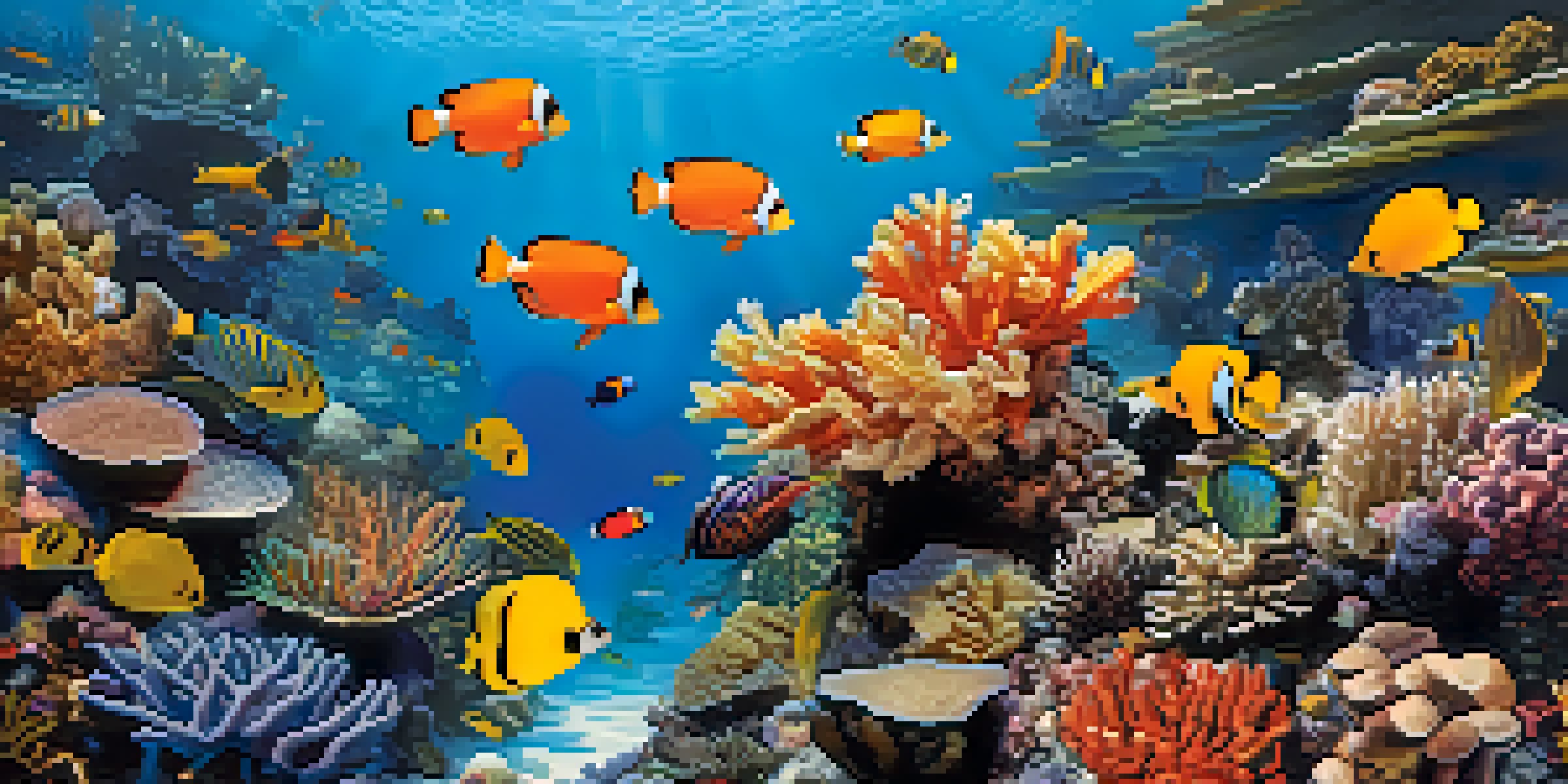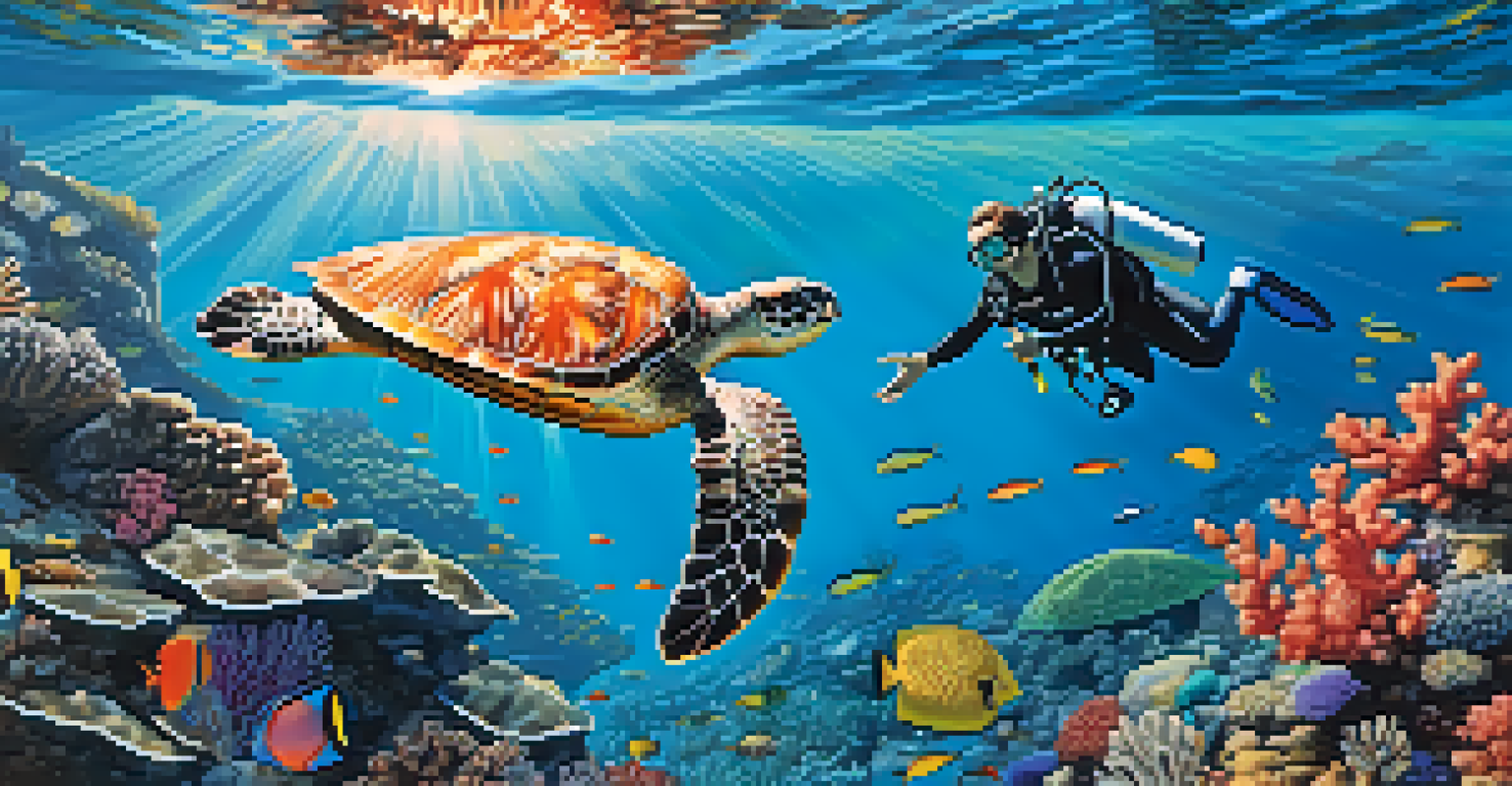Exploring Coral Reefs: A Scuba Diver's Paradise

The Beauty of Coral Reefs: Nature's Underwater Gardens
Coral reefs are often referred to as the 'rainforests of the sea' due to their stunning biodiversity. These underwater ecosystems host thousands of marine species, from colorful fish to intricate invertebrates. Imagine gliding through crystal-clear waters, surrounded by vibrant corals and schools of tropical fish dancing around you.
The greatest threat to our planet is the belief that someone else will save it.
The visual spectacle of coral reefs is nothing short of breathtaking. Brightly colored corals come in various shapes and sizes, creating a picturesque landscape that divers yearn to explore. Each dive offers a unique experience, as the light filters through the water, illuminating the reef's intricate details.
Beyond their beauty, coral reefs play a crucial role in marine life and coastal protection. They provide habitats for countless species and act as natural barriers against storm surges and erosion, making them vital for both the environment and local communities.
The Different Types of Coral Reefs and Their Features
Coral reefs can be classified into three main types: fringing reefs, barrier reefs, and atolls. Fringing reefs are closest to shore, often forming a protective barrier along coastlines. Barrier reefs, on the other hand, are separated from the shore by deeper waters, while atolls are ring-shaped reefs that encircle lagoons.

Each type of reef has its unique characteristics and ecosystems. For instance, fringing reefs are easily accessible for beginner divers, while atolls offer a more remote diving experience filled with unique marine life. Understanding these differences can enhance your diving experience and help you choose the right destination.
Coral Reefs: Biodiversity Hotspots
Coral reefs are essential ecosystems that support a vast array of marine life while providing crucial coastal protection.
Exploring these various types of reefs can lead to encounters with diverse wildlife. From the vibrant clownfish hiding in anemones to majestic sea turtles gliding gracefully above the coral, each dive can uncover new surprises and unforgettable memories.
Essential Gear for Scuba Diving in Coral Reefs
Before diving into the wonders of coral reefs, it's crucial to have the right gear. A well-fitted wetsuit, mask, and fins are essential for comfort and mobility underwater. Additionally, a reliable scuba tank and regulator will ensure you have a safe and enjoyable dive experience.
We won't have a society if we destroy the environment.
Don't forget about accessories like a dive computer, which helps you monitor your depth and time underwater. A good underwater camera is also a must for capturing the vibrant marine life and stunning coral landscapes you encounter during your dives.
Ultimately, investing in quality gear not only enhances your diving experience but also ensures your safety. A well-prepared diver can fully immerse themselves in the breathtaking world beneath the waves, making every dive an adventure to remember.
Marine Life: Encounters with Fascinating Creatures
Diving in coral reefs is like stepping into an underwater zoo filled with incredible fauna. From the playful dolphin to the elusive octopus, each dive presents a chance to see unique marine life up close. Many divers report feeling a sense of wonder and connection with these creatures during their underwater explorations.
Colorful fish, such as parrotfish and angelfish, are often seen darting between coral formations. Meanwhile, larger marine animals like sharks and rays can add a sense of thrill to the experience. Learning about their behaviors and roles in the ecosystem can deepen your appreciation for these magnificent beings.
Threats Facing Coral Reefs
Climate change and pollution pose significant risks to coral reefs, leading to coral bleaching and ecosystem decline.
It's important for divers to respect marine life and their habitats. Observing from a distance and avoiding touching or disturbing creatures ensures that these ecosystems remain healthy for future generations. Responsible diving practices contribute to the conservation of coral reefs and their inhabitants.
The Importance of Coral Reefs for Ecosystems
Coral reefs are vital for maintaining the health of our ocean ecosystems. They provide shelter and food for numerous marine species, playing a crucial role in the food web. Without healthy reefs, many fish populations would decline, impacting both marine life and human communities that rely on fishing.
Additionally, coral reefs help to protect coastlines from erosion and storm damage. By acting as natural barriers, they absorb wave energy, reducing the impact on shorelines. This protective function is especially important as climate change leads to rising sea levels and more intense storms.
Understanding the significance of coral reefs emphasizes the need for their conservation. Protecting these ecosystems not only preserves marine biodiversity but also supports the livelihoods of millions of people who depend on them for food, tourism, and coastal protection.
Threats to Coral Reefs: Climate Change and Pollution
Despite their beauty and importance, coral reefs face numerous threats, primarily from climate change and pollution. Rising ocean temperatures can lead to coral bleaching, where corals expel the algae that provide them with color and nutrients. This process can be devastating, often resulting in large-scale die-offs.
Pollution from land-based sources, such as agricultural runoff and plastic waste, further exacerbates the decline of coral reefs. These pollutants can smother corals and disrupt the delicate balance of marine ecosystems. Addressing these issues requires collective action on a global scale.
Join Coral Reef Conservation Efforts
Individuals can make a difference by participating in local conservation initiatives and adopting sustainable practices.
Awareness of these challenges is crucial for divers and ocean enthusiasts. By supporting sustainable practices and advocating for policies that protect marine environments, we can help combat the threats to coral reefs and ensure their survival for future generations.
Conservation Efforts: How You Can Make a Difference
Many organizations and initiatives are working tirelessly to protect coral reefs around the globe. From coral restoration projects to marine protected areas, these efforts aim to combat the threats facing these ecosystems. Getting involved with local conservation groups can amplify your impact.
As a diver, you can contribute to conservation efforts by participating in reef clean-up events or citizen science projects. Collecting data on marine life and reporting sightings can help researchers monitor reef health and track changes over time. Every little bit counts in the fight to preserve these underwater treasures.

Additionally, making conscious choices in your daily life, such as reducing plastic use and supporting sustainable seafood, can contribute to the well-being of coral reefs. By being an informed and responsible ocean advocate, you can help ensure that future generations can enjoy the beauty and wonder of coral reefs.